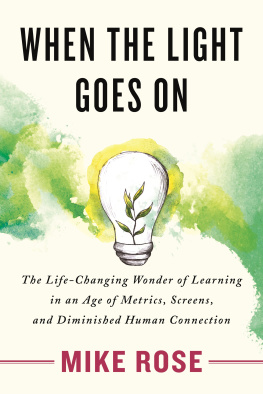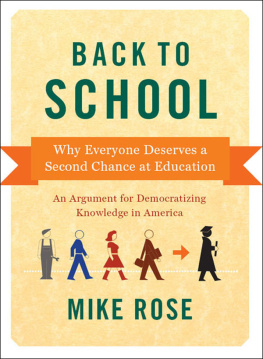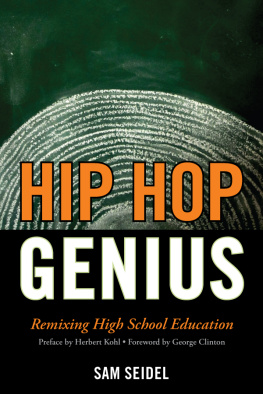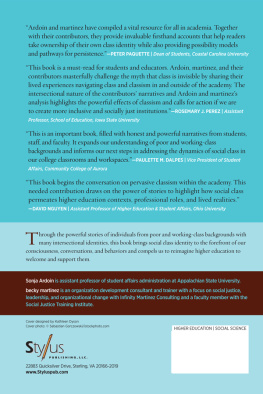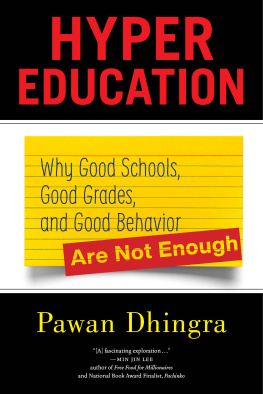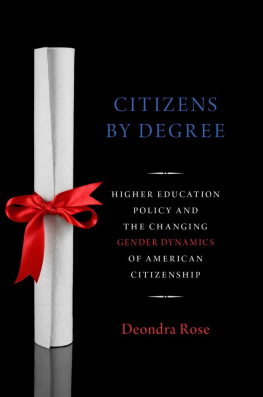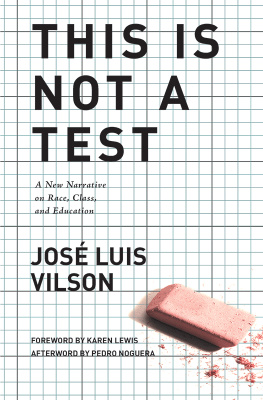Contents
Pagebreaks of the print version
Guide

FOREWORD
E ducation matters. It matters for health and quality of life, for democracy and a civil society. Mike Rose understood this deeply. For Mike, education is about nurturing intelligence, a blending of the practical and experiential, the cognitive and analytic. It is also about the potential in individuals and for humanity. Mike was masterful at showing us the different angles of how and why education shapes growth and opportunity. His perspectives on educational possibility and inequality in our society are understood through the careful telling of stories of peoples lives, including his own. Through his writings you learn of the power of a good education and of the various ways in which smarts are inspired, developed, and articulated in everyday, commonplace teaching and learning. At his core, Mike was a teacher. He was also a writer.
While working to publish this book, my dear friend and colleague passed away. Most deaths feel untimely, but Mikes felt particularly so, as there were no indications of fatally ill health. The loss of Mike Rose was immense for the many who care about education, and particularly for those of us who knew him well. His intellect along with his thoughtfulness made him an endeared colleague and friend, one who lifted spirits with his humor and kindness. His dedication to his craft was in humility and without pretension, even while he earned vast national recognition for his work.
Mike Rose joined the faculty of the School of Education and Information Studies at UCLA in 1994, having already published on central issues in education, including perhaps his most well-known and praised book Lives on the Boundary: A Moving Account of the Struggles and Achievements of Americas Educationally Underprepared. In all of his writings, Mike challenged prevailing narratives and national conversations that seemed to drown out the subtleties and lived realities of education. They were an antidote to the wholesale, broad-brush portrayals that denied the humanity and very real experiences of its participants.
Arguably one of the most important modern-day scholars of education, he was at once master of literary technique and rigorous in his research approachmeticulous documentation, thick description, and reflexivity. Through literary imagination and ethnographic depth, he brought the vibrancy of classrooms and the workplace, and the teaching and learning that transpires within these spaces, to life. Equally importantly, he was a champion of the promise of quality, public education for all.
When the Light Goes On is Mikes final major work. The writing and publication of this book was so important to Mike. He had been working on it for several years, conducting interviews, engaging in focused discussions with colleagues and friends, questioning his insights and the tensions he was observing, iteratively testing his hypotheses, and constructing every sentence with a delicate exactness. This was his process.
Here, Mike examines education as a complex human endeavor. Guiding us through his own and others personal experiences, he shares with us the power of the moment. He aims to make what is good and right in education, and often invisible, visible. He brings us close to the person, the student, and the teacherwhile also revealing much about himself, an intimate look that helps us better appreciate the complexity of contemporary educational and social issues, as we come to understand these issues through a story of a human experience. His prose is sophisticated, and he writes so that his words are meaningful to those about whom he is writing. In the end, we appreciate the ways in which education excites curiosity, struggle, love, and joy.
One day, when I was drained by the stressors of being a university administrator, I followed the suggestion of Mike and walked across the UCLA campus to our laboratory elementary school. And just as he knew it would, my brief observations of the children and their teachers brought a renewed sense of purpose to my work, and not only for that day. At its best, education is transformational, and not just for the student. It is this marvel that Mike Rose brings to us in this book, the extraordinary in the ordinary. Enjoy this, his last gift to us.
Christina A. Christie
PREFACE
E ducation is human work with human beings. Therein lies its power and its beauty and most everything we are at risk of losing. We have been converting education into a vast assessment, scoring, and ranking enterprise; a laboratory for magic-bullet reforms; a platform for high-tech utopians and entrepreneurs; and a fiercely competitive arena of advantage and status that grinds the poor and propels the middle class into debt and frenzy. The justifications behind some of these developments have merit in the abstractaccountability, rigor, innovationbut as so often happens in our time, the technology or procedure we establish to attain a worthwhile goal becomes an end in itself, the focus of effort and expense. Educations vibrant human core fades from policy and public discussion, diminishing the imagination of our school boards and the joy in our classrooms.
To reclaim that joy and imagination, I take us in close to the lives of a wide range of Americans, exploring with them those times when education broadened what they knew about the world and about themselves, in some cases changing their lives. What better way to gain insight into education at its best, a view both empirical and intimate? Their stories span the primary grades through graduate study, involve mathematics and history, literature and dance, occupational programs and GED classes. Various assessments, technologies, and the like are often part of these stories, but are secondary, in the service of peoples engagement with ideas, books, experiments, and tools that matter to them. We witness how learning is lived, the foundation for a more humane and generous vision of education.
There is a personal dimension to this project, for, as with a number of people I interviewed, a teacher had a profound effect on my young life. I therefore include my story, for without that teacher, I wouldnt have been able to write this book, wouldnt know in my bones what can happen when education takes hold, and wouldnt have spent a lifetime in classrooms thinking about the transformational possibilities of these everyday places.
INTRODUCTION
WHEN THE LIGHT GOES ON
I am tutoring a tenth-grade boy in basic geometrythe properties of angles. He is having a hard time, and it shows. His jaw is tight with anger and defeat. I ask him again to tell me what hes doing, unsure myself of how to help him, but something in what he says clues me into another way to explain the concept underlying the calculations. He listens, immobile. Then his eyes widen. He shifts forward, up over the worksheet, and solves the problem without any further assistance from me. His jaw eases. His shoulders relax. We do a few more problems to be safe. As Im getting up to go to the next student, he grabs my forearm. Thanks, he says, looking right at me. Thanks a lot.
You see it in their faces. A brightening. Compressed within this boys shift from frustration to knowing, there is a rich story of education that opens up onto the human condition. In its basic structure, the boys success offers a familiar snapshot of insight, a

